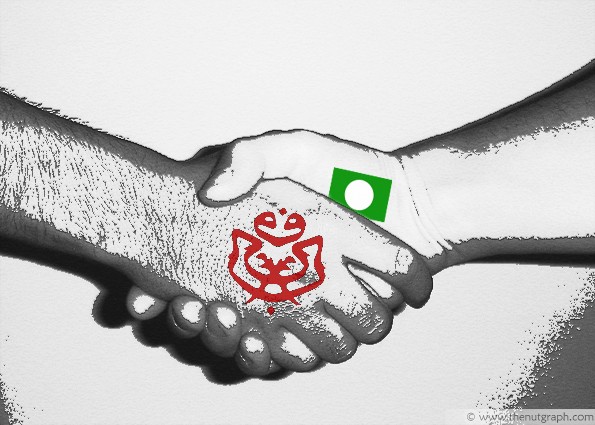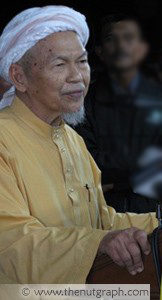AS part of its “Malay unity” rhetoric, Umno has been making overtures to PAS once again to have unity talks.
PAS was a component party of the Barisan Nasional from 1974 to 1978, before the cooperation broke down and PAS left the coalition to become part of the federal opposition. Despite being rebuffed, Umno continues to express hope of talks between both parties, especially with the onset of Ramadan.
In part two of an interview with political scientist Wong Chin Huat on Malay unity, The Nut Graph asks who stands to gain from PAS-Umno unification, and what it would take for PAS to consider Umno’s overtures seriously.

(Handshake by robert82 / sxc.hu)
TNG: What’s the appeal for either Umno or PAS to “unite”? Who stands to gain more from unification?
Wong Chin Huat: Ideologically, both Umno and PAS do not subscribe to political pluralism for their defined constituencies – Malays and Muslims – who happen to highly overlap in the context that is Malaysia.
Umno and PAS are therefore antithetical to each other’s raison d’être. For Umno, the existence of PAS is illegitimate because a second Malay party disunites Malay Malaysians. Vice-versa, for PAS, Umno’s presence divides the Muslims.
The unity talk is therefore paradoxical. You can’t have a halfway house. If Malay-Muslims are to be united under one party, then Umno and PAS have to merge. But would either Umno or PAS politicians really want to embrace each other as comrades?
The unity talk is therefore a political gimmick to show voters who are obsessed with ethno-religious unity or solidarity: “It’s the other party that rejects Malay/Muslim unity, reject them!” And why should Malay Muslims unite? The unspoken logic is, of course: “Because we are threatened by the non-Malays/non-Muslims.”
Only Umno can win this unity game. Any PAS politician who thinks otherwise is a naïve hare who believes he or she can outsmart an old fox. If any “unity plan” materialises, it will be largely on the terms of the incumbent, Umno. Over time, Umno will play one faction in PAS against another to weaken its rival.
That’s how PAS eventually lost Kelantan in 1978. If the unity talks fail, Umno’s propaganda machine that reaches out to Malay Malaysians will surely blame it on PAS. Most damagingly, PAS will lose the hard-earned trust of non-Malay Malaysians and be condemned to only super-majority-Malay constituencies, whether as Umno’s ally or foe. It will then likely die a natural death and concede the anti-Umno Malay voters to Parti Keadilan Rakyat (PKR).
PAS‘s vision is to set up an Islamic state, which puts Islamic principles at the forefront of governance. Would PAS be more likely to achieve this goal if it partnered with Umno rather than the Pakatan Rakyat (PR)?
Islamisation has two implications in Malaysian politics. The first, which may not be so Islamic in principle, is to strengthen the power of Islam and Muslims vis-à-vis the other faiths and religious minorities. Also, to curb diversity within the ummah; for example, by suppressing the liberals, feminists, sexual minorities, Shiites or “heretic” groups.

(Source: Wiki commons)
In this respect, Umno would make the best ally for any Islam-centrist party on issues like the Allah row, the apostasydisputes, and restrictions on non-Muslim places of worship. But I suspect the mainstream opinion in PAS is not so inclined. Go to Tumpat, Kelantan and you find pigs reared by Thai Malaysians roaming in the Malay villages.
Umno’s brand of Islam, however, is seemingly more rooted in the ethnically mixed west-coast states. The huge presence of the other, i.e. of non-Muslims and non-Malays, in these states may naturally lead to a strong sense of insecurity or of being under siege among many Muslims.
The second aspect of Islam is to promote Islamic values to both Muslims and non-Muslims. Some aspects are happily embraced by all without any imposition. The best example of this is Islamic banking, where the majority of depositors are apparently non-Muslim Chinese Malaysians.
Other aspects of Islamisation may actually cause conflicts between PAS and Umno, but more likely across ethno-religious fault lines. For example, if PAS were to campaign against corruption and the Internal Security Act, it may go against the vested interests of the corrupt in Umno. In these aspects, PAS’s natural partners would likely be progressive multiethnic or multifaith parties.
Is there a difference in Malaysia between political unity and religious unity? Can Malay Malaysians in PAS and Umno unite religiously without doing so politically?
Umno Muslims, PAS Muslims, PKR Muslims and DAP Muslims pray the same way every Friday and when performing the haj, don’t they?
Judging from media reports, how firm is PAS in rejecting Umno‘s recent overtures for unity talks to happen? There have been PAS members who have added caveats such as stating they are with the PR “at this moment”. What would prompt PAS to take any such overtures more seriously in the future?
The reservation of some PAS politicians about its membership in the PR is perfectly understandable. For the most part of history, Malay Malaysian politics has only been able to accommodate two parties. Three makes a crowd.
Till 2008, PAS was secure as the second party and was aiming to replace Umno as the first. After 2008, they find themselves as the No. 3 Malay-Muslim dominant party after the nationalist Umno and the multiethnic PKR. The natural worry is, if one of the three parties must be dropped to sustain the balance, will it be PAS?
Talking to Umno will temporarily alleviate this fear because if all national issues were seen through an ethno-religious lens, the Malay-Muslim constituency would have to be represented by Umno and PAS. Umno has a natural interest to save PAS because PKR can be its terminator.

PAS spiritual leader Nik Aziz Nik Mat: No way to PAS-Umno unity, but for how long?
But if the unity talk continues, PAS’s worst nightmare of being winnowed out may come true as PKR will easily absorb most of its anti-BN votes from the Malay and non-Malay Malaysians.
PAS’s future of emerging as the largest or second largest Muslim-dominant party lies in defeating Umno. But will PAS have the stamina to go the distance? That largely depends on the next election outcome, and ironically more on non-Muslim voters than Muslim voters.
Outside of Kelantan, PAS enjoys an average of 40% Muslim support. Landslide non-Muslim support would allow it to capture many Malay-majority-mixed constituencies.
If non-Muslims hold back their support, PAS would be left with lawmakers elected from the Muslim heartland. They may not see much incentive to remain in the PR. In that sense, counter-intuitively, it is the non-Muslims who will determine if the talks about hudud will be revived after the next elections.
Wong Chin Huat is a political scientist by training and a journalism lecturer by trade. If readers have questions and issues they would like Wong to respond to, they are welcome to e-mail editor@thenutgraph.com for our consideration. Courtesy of Nut Graph


No comments:
Post a Comment
Note: Only a member of this blog may post a comment.